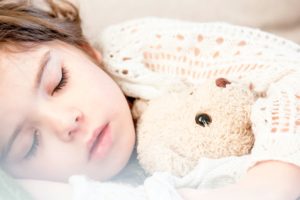 Obstructive sleep apnea affects 18 million Americans, which causes frequent breathing disruptions. Contrary to what you might believe, it doesn’t just affect adults. 7% to 9% of children have a sleep-related breathing disorder, like sleep apnea; however, up to 90% of cases aren’t diagnosed because symptoms can be subtle. Here’s how to spot the signs of childhood sleep apnea, so your little one can sleep peacefully.
Obstructive sleep apnea affects 18 million Americans, which causes frequent breathing disruptions. Contrary to what you might believe, it doesn’t just affect adults. 7% to 9% of children have a sleep-related breathing disorder, like sleep apnea; however, up to 90% of cases aren’t diagnosed because symptoms can be subtle. Here’s how to spot the signs of childhood sleep apnea, so your little one can sleep peacefully.
Signs of Childhood Sleep Apnea
Children can suffer from 2 types of sleep apnea: obstructive or central. Obstructive sleep apnea occurs when there’s a blockage in the nose or throat, which is why loud snoring is often a symptom.
Central apnea is the result of incorrect signals sent from the brain to the muscles responsible for breathing. Unlike obstructive sleep apnea, central usually doesn’t cause snoring.
Both types can cause a variety of symptoms, like:
- Coughing or choking while sleeping
- Pauses in breathing
- Breathing through the mouth
- Sleep terrors
- Bedwetting
- Sleeping in odd positions
Symptoms of sleep apnea can appear during the day, too. Pauses in breathing interrupt your child’s sleep cycle. Poor sleep quality can lead to irritability or difficulty concentrating.
Researchers have also found a link between untreated sleep apnea and hyperactivity. Children may also suffer from growth delays, heart problems, or cognitive issues.
Treating Childhood Sleep Apnea
Every situation is unique, so there’s no cookie-cutter treatment. It’s not unusual for some children to outgrow sleep apnea. They may be monitored by a physician to ensure there is an improvement. Their physician may also recommend:
- Lifestyle Changes: Obesity increases the risk of sleep apnea. A healthy diet and regular exercise can help your child maintain a healthy weight.
- Nasal Steroids: Nasal steroids reduce inflammation in the nose to make it easier to breathe.
- Surgery: Large tonsils or adenoids can contribute to obstructive sleep apnea. Their physician may recommend surgery to remove them if other treatments fail.
- CPAP Therapy: A machine delivers a gentle stream of air pressure through a mask worn over the mouth and nose to keep the airway open.
- Oral Appliance: An oral appliance repositions your child’s jaw and tongue to prevent an obstruction in the airway.
Ensure a Good Night’s Rest
Quality sleep is important for your little one’s mental and physical wellness. Don’t let sleep apnea affect their health, development, or quality of life. If your child shows signs of the disorder, contact their physician for a sleep study.
About Dr. Jay A. Nelson
Dr. Nelson earned his dental degree from the University of Pennsylvania and has continued his education in dental sleep medicine. He is a member of many professional organizations, including the American Board of Dental Sleep Medicine. Request an appointment through our website or call (813) 694-1580.
